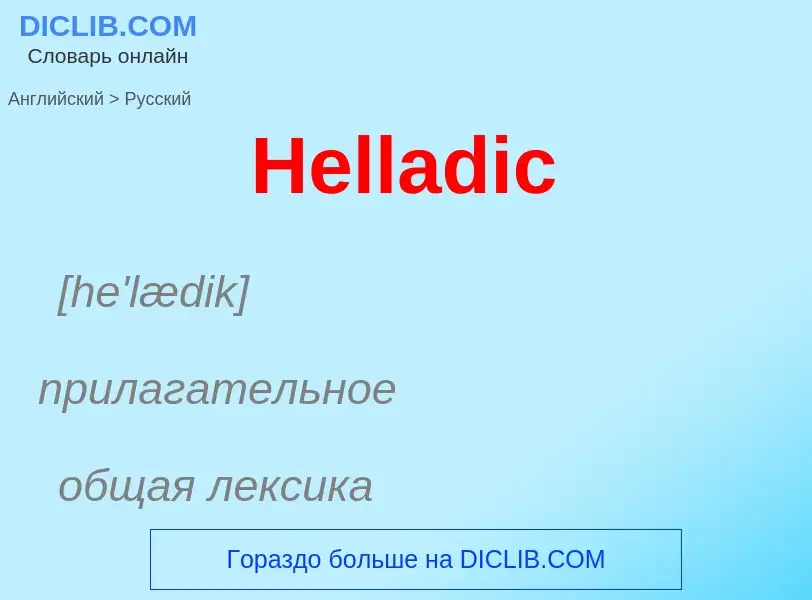Перевод и анализ слов искусственным интеллектом ChatGPT
На этой странице Вы можете получить подробный анализ слова или словосочетания, произведенный с помощью лучшей на сегодняшний день технологии искусственного интеллекта:
- как употребляется слово
- частота употребления
- используется оно чаще в устной или письменной речи
- варианты перевода слова
- примеры употребления (несколько фраз с переводом)
- этимология
Helladic - перевод на русский
[he'lædik]
прилагательное
общая лексика
относящийся к Элладе
к доэллинскому периоду Древней Греции
Определение
Википедия

Helladic chronology is a relative dating system used in archaeology and art history. It complements the Minoan chronology scheme devised by Sir Arthur Evans for the categorisation of Bronze Age artefacts from the Minoan civilization within a historical framework. Whereas Minoan chronology is specific to Crete, the cultural and geographical scope of Helladic chronology is confined to mainland Greece during the same timespan (c. 3200 – c. 1050 BC). Similarly, a Cycladic chronology system is used for artifacts found in the Aegean islands. Archaeological evidence has shown that, broadly, civilisation developed concurrently across the whole region and so the three schemes complement each other chronologically. They are grouped together as "Aegean" in terms such as Aegean art and, rather more controversially, Aegean civilization.
The systems derive primarily from changes in the style of pottery, which is a benchmark for relative dating of associated artifacts such as tools and weapons. On the basis of style and technique, Evans divided his Cretan Bronze Age pottery finds into three main periods which he called Early, Middle and Late Minoan. These were sub-divided into phases and some of those into sub-phases. The Helladic and Cycladic schemes were devised later and have similar sub-divisions. Evans' system has stood the test of time remarkably well but his labels do not provide firm dates because change is never constant and some styles were retained in use much longer than others. In fact it is partly this lack of dates that has been the strength of Evans’s system; several of the dates Evans believed have certainly changed, and others remain under discussion, though within fairly narrow ranges, but the scheme just adjusts for such changes. Some pottery can be dated with reasonable precision by reference to Egyptian artifacts whose dates are more certain.
Helladic society and culture have antecedents in Neolithic Greece when most settlements were small villages which subsisted by means of agriculture, farming and hunting. The gradual development of skills such as bronze metallurgy, monumental architecture and construction of fortifications brought about the transition from the Neolithic to the Bronze Age. The Late Helladic (c. 1550 – c. 1050 BC) is sometimes called the Mycenaean Age because Mycenae was then the dominant state in Greece. At the end of the Bronze Age (c. 1050 BC), Aegean culture went into a long period of decline, termed a Dark Age by some historians, as a result of invasion and war.


![Gold [[Mask of Agamemnon]], Late Helladic 16th century BC. Gold [[Mask of Agamemnon]], Late Helladic 16th century BC.](https://commons.wikimedia.org/wiki/Special:FilePath/MaskOfAgamemnon.jpg?width=200)
![Louvre]]). Louvre]]).](https://commons.wikimedia.org/wiki/Special:FilePath/Stirrup vase Rhodes Louvre CA2906.jpg?width=200)

![The [[Dendra panoply]], Mycenaean armour, 1400 BC. The [[Dendra panoply]], Mycenaean armour, 1400 BC.](https://commons.wikimedia.org/wiki/Special:FilePath/Πανοπλία των Δέντρων 8005.jpg?width=200)
